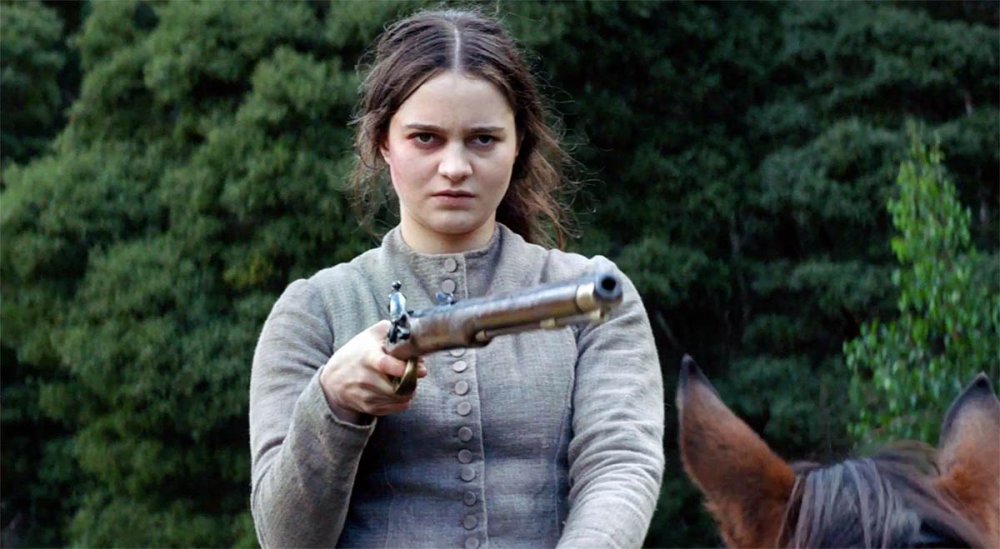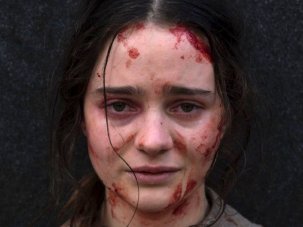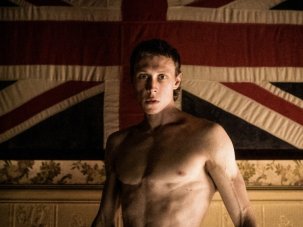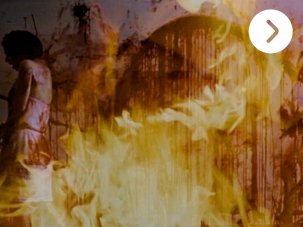Spoiler alert: this review reveals a plot twist
In 2014, Australian filmmaker Jennifer Kent’s debut The Babadook effectively harnessed and manipulated genre traditions to present a powerful study of the psychological complexities of motherhood and the devastating effects of trauma. For her second feature The Nightingale, the writer-director returns to similar narrative territory, this time reshaping western tropes to explore the enduring strength of the bond between mother and child, the destructive inhumanity of European colonialism and the devastating impact of unfettered female fury. The result is a profound primal scream of rage and revenge.
Australia/USA/Canada 2018
Certificate 18 136 mins approx
Director Jennifer Kent
Cast
Clare Aisling Franciosi
Hawkins Sam Claflin
Billy Baykali Ganambarr
Ruse Damon Herriman
Jago Harry Greenwood
Goodwin Ewen Leslie
Eddie Charlie Shotwell
Aidan Michael Sheasby
Uncle Charlie Charlie Jampijinpa Brown
Lowanna Magnolia Maymuru
[1.37:1]
Part-subtitled
UK release date 29 November 2019
Distributor Vertigo Films
thenightingalefilm.co.uk
► Trailer
When we first meet young mother Clare (an incredible Aisling Franciosi) in Van Diemen’s Land (now known as Tasmania) in 1825, she’s singing to her baby daughter as they walk through the forest. While her voice is light and beautiful – lending her the moniker of the film’s title – she has a knife clutched firmly in her hand. It’s the first indication that dangers lurk large in this land, where European settlers are clashing violently with the indigenous Aboriginal population.
We soon realise that Clare’s fears lie close to home. An Irish convict, she is employed in the service of a British officer, Lieutenant Hawkins (an excellent Sam Claflin), who refuses to release her to her husband Aidan (Michael Sheasby), even though she has served her time. When Aidan confronts Hawkins, the soldier responds in the most brutal of ways, raping Clare in front of her husband and then shooting him dead. As the baby’s screams become increasingly insistent, and Hawkins increasingly irate, fellow soldier Jago (Harry Greenwood) dashes the child against the wall.
Almost impossible to watch, this sequence is pivotal not just in terms of the film’s narrative, but also in its demonstration of Kent’s command of story and craft. Savage and intense, the scene is masterfully controlled; in soft candlelight, filmed in tight close-up, it is unflinching without ever becoming exploitative. This is not a moment of madness for these soldiers, but just another example of their sense of entitlement and ownership over the land and everything in it. It is not about pleasure, or even the need to sate animalistic urges; it’s entirely about masculine dominance.
But that power balance is destined to shift, and from here Kent reframes the traditional western revenge tale within a female perspective. When Clare awakens from her ordeal, the light in her eyes has been replaced with an instinctual strength and resolve. She is determined to hunt down Hawkins, who has departed on foot for a captaincy in the north – one that, tellingly, his superiors believe he is unfit to hold – along with Jago and a third officer, Ruse (Damon Herriman). Teaming up with Aboriginal tracker Billy (Baykali Ganambarr), Clare makes the arduous journey through the wilderness, where, despite the inhospitable terrain, the real dangers are the white men they meet along the way.
It’s thanks to the relationship between Clare and Billy that The Nightingale moves beyond its retribution narrative to become something more thematically knotty. In an exceptional, nuanced debut performance from former dancer Ganambarr, Billy has both autonomy and grace, his reasons to hate the white man no less personal or valid than Clare’s. Yet, in their early interactions, Clare treats him with disdain, as a servant to do her bidding.
Much like Clare, Billy knows how to submit in order to survive – often disappearing into the undergrowth at perilous moments. “I’m paying you to protect me,” she spits at him, after narrowly avoiding the advances of a chaingang officer. “I’m showing you the way,” is his measured response. “You protect yourself.” Crucially, Billy is determined to defend his own worth by calling out her behaviour – the fact that, despite the atrocities wrought upon her, her moral code may be limited by ingrained notions of racial hierarchy. Slowly a rapport develops, a respect that becomes about more than their shared desire for vengeance.
The complexities of their relationship are as vast and thorny as the landscape around them, yet cinematographer Radek Ladczuk shoots in stunning Academy ratio, avoiding the temptation to widen out. This journey is one of claustrophobic inevitability; the rugged texture of haunted faces, torn clothing, mud and blood form the film’s visceral palette. Silhouettes of trees in the moonlight are suggestive of the grim nightmares playing out within.
And much of The Nightingale is nightmarish – the violence and pain and barbarity often overwhelm – but it is never indulgent. Kent also finds plenty of raw power in the quieter moments. Clare’s leaking breasts are both a reminder of all she’s lost and a painful hindrance to her quest. The soulful song she sings in a bar full of men when she finally catches up with Hawkins reverberates with more menace than any gunshot. A single deep breath, taken at film’s end, is melancholic rather than cathartic. While we may applaud the fact that Clare and Billy have wrought justice on their oppressors in a way that not many onscreen women and minorities are allowed to do, the fact that they derive no pleasure from it – that it brings no relief – is the most expertly landed gut punch of this astonishing, essential work.
-
The 100 Greatest Films of All Time 2012
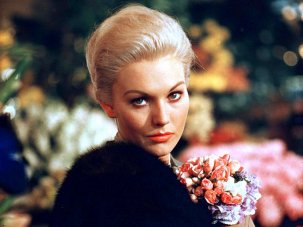
In our biggest ever film critics’ poll, the list of best movies ever made has a new top film, ending the 50-year reign of Citizen Kane.
Wednesday 1 August 2012
-
The best films now on UK streaming services

Looking for the best new cinema releases available on British VOD platforms? Here’s our guide to how to keep up with the latest movies while you’re...
-
The Digital Edition and Archive quick link
Log in here to your digital edition and archive subscription, take a look at the packages on offer and buy a subscription.




